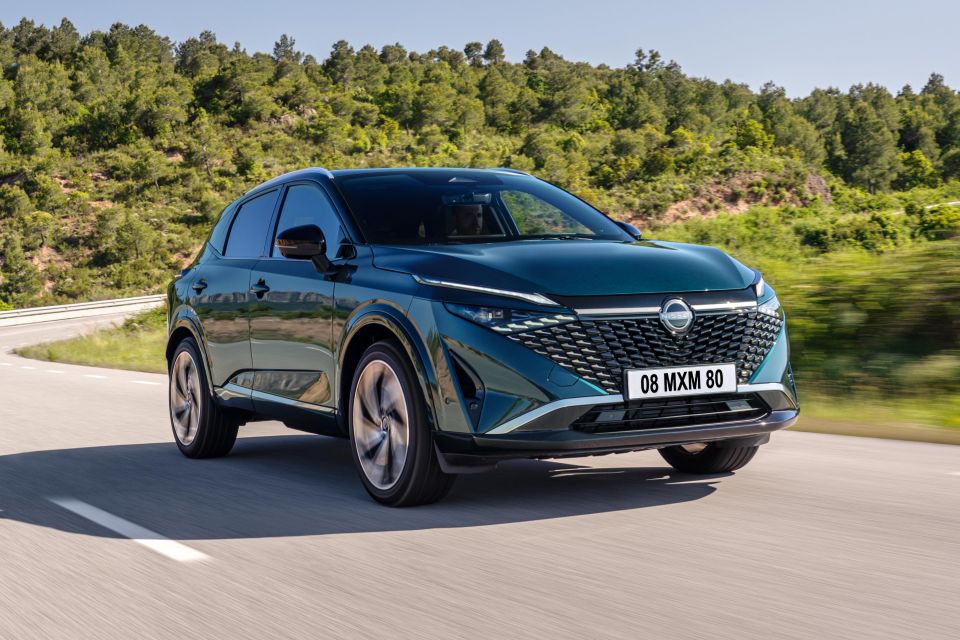The Nissan Qashqai small SUV will go hybrid-only next year, coinciding with the launch of a more efficient new third-generation version of its e-Power series hybrid drivetrain.
Scheduled to arrive in the first half of 2026, the upgraded Qashqai e-Power has been re-engineered to provide a claimed 16 per cent improvement to real-world fuel economy, including a 14 per cent improvement in highway fuel consumption.
Further, with quoted efficiency of 4.5L/100km on the WLTP combined cycle, the updated Qashqai e-Power boasts a theoretical driving range of 1200km per tank of fuel. CO2 emissions have also been cut by 12 per cent (102g/km v 116g/km).
Nissan also claims the new model brings a 5.6dB reduction in cabin noise, and there’s a 10kW boost in power when Sport Mode is selected for better acceleration response.
CarExpert can save you thousands on a new car. Clickhereto get a great deal.

Note: Overseas model pictured throughout
Nissan Australia hasn’t confirmed local pricing and specification details for its fresh Qashqai lineup, but Nissan Oceania managing director Andrew Humberstone provided some clues in a follow-up interview.
“We see the [small SUV] segment growing here. We want to be able to deliver a quality product to a consumer that is on the journey to electrification,” Mr Humberstone told CarExpert.
“I’m really keen to be a fast follower [in this space] because we have, unlike many OEMs, such a good range of product. Do we need to have 12, 13, 14 variants when actually I could have five or six, be much more efficient and targeted, and that’s 80 per cent of the volume?
“It’s less about being everything to everybody than actually focussing on clear customer demands and requirements,” Mr Humberstone added.
Currently, the Nissan Qashqai range in Australia comprises seven variants across five distinct trim levels, including turbo-petrol and e-Power hybrid powertrain variations.

While it seems logical for the MY26 Qashqai e-Power range to simply slot into the existing trim walk – ie: ST, ST-L, Ti, Ti-L and N-Design – Mr Humberstone doubled down on this particular model “not [being] everything to everybody”.
“It can’t be the cheapest, and the quality of that product doesn’t deserve to be [the cheapest]. Do I want to be selling thousands of them to fleet? Well, maybe not.
“We’re adopting a much more strategic approach not just as a brand, but by nameplate, by model… we’re not just having accidents, we’re not just guessing. We’re being research driven, data driven, customer driven, and we’re going to be agile enough to respond to competitors and also to changing consumer demands.”
At a separate media conference, Mr Humberstone also said: “We want to be very careful where we position the cars, and we are looking at what options there are for us to compensate in different price areas, which historically was not on the table globally”.
“Today’s strategy, for the last 12 months, [is that] these are the cars we want in the market, this is the price we want. I’ve engaged with my dealer network, my dealers are committed to ‘x’ volume and ‘x’ price of the product – can we make it?”

Mr Humberstone’s comments suggest that Nissan’s local division will be going more aggressive with price positioning, despite the fact the Qashqai is sourced from the brand’s Sunderland factory in the UK, rather than Japan like the X-Trail. That said, Australia has had a free trade agreement with the UK as of May 2023.
Pricing for the petrol-powered Qashqai currently starts from $34,665 plus on-road costs, while the most attainable Qashqai e-Power costs $47,165 and is based the mid-spec Ti trim level. Spec-for-spec, e-Power variants currently command a $4200 premium over equivalent turbo-petrol versions in Australia.
With that in mind, Nissan Australia could easily offer an entry-level ST-spec Qashqai e-Power for under $40,000, though it’s unclear whether the new-generation drivetrain will be more expensive or whether the brand’s local arm will cull the base trim level.
The new Nissan e-Power system uses a new lighter and more compact five-in-one powertrain incorporating the electric motor, generator (petrol engine), inverter, reducer and increaser. Some of these components were also “engineered, prototyped and manufactured in Australia” at the Nissan Casting Australia Plant in Dandenong, Victoria.
The new 1.5-litre turbocharged three-cylinder petrol engine is claimed to be all new – despite its similarities with the existing engine – and includes a larger turbocharger, which Nissan says lowers revs and brings fuel savings at highway speeds.
As well as better fuel economy, peak power output increases by 11kW to 151kW. The updated Qashqai e-Power uses the same 2.1kWh lithium-ion battery pack as before.

Stay tuned to CarExpert for all the latest!
MORE: 2026 Nissan Qashqai e-Power gets next-gen hybrid tech with 1200km of range

